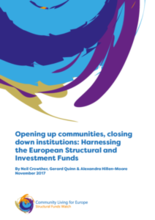Displaying 281 - 290 of 691
To accompany the release of the learning guide “Deinstitutionalisation of Europe’s Children: Questions and Answers”, the Opening Doors for Europe’s Children has prepared an online quiz to test the knowledge and tackle some of the tricky questions on deinstitutionalisation (DI).
The Australian Parliament has released a Report of its inquiry into establishing a Modern Slavery Act in Australia. This Inquiry Report recognizes orphanage trafficking as a form of modern slavery to be included in the Act.
This outline of alternative care, both conceptually and in the Sri Lankan context, provides insight into both the current system and what efforts are yielding results.
In this video from Time for Global Action: Advancing the Sustainable Development Goals, Stephen Ucembe shares his experience of living in an orphanage and how institutionalization was detrimental to his development and wellbeing.
The objective of this essay is to determine how substitute child care in the Czech Republic has changed in the last ten years.
This study examined the status of the State Program on Deinstitutionalization and Alternative Care (SPDAC), a public policy aimed at transforming 55 institutions covering 14,500 children during 2006–2016 in Azerbaijan.
This study examined the status of the State Program on Deinstitutionalization and Alternative Care (SPDAC), a public policy aimed at transforming 55 institutions covering 14,500 children during 2006-2016 in Azerbaijan.
This report from Community Living for Europe: Structural Funds Watch reviews findings of an examination of the EU financial framework as it relates to the promotion of community-based care of children and adults and offers key recommendations for the EU and Member States to facilitate the transition from institutional to community-based care.
This video from UNICEF Rwanda shows some of the moving stories of children and their new families who have been brought together through the TMM initiative, which reintegrates children who have been living in institutions into families and the community.
This position paper from Opening Doors for Europe's Children explains the position of the organization in regards to the EU's Multiannual Financial Framework and the measures within it to support or inhibit the transition from institutional care to family-based care of children.




